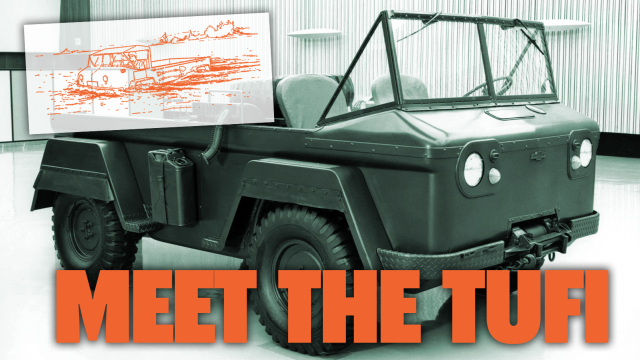Prior to Ralph Nader’s book panning the Corvair, Unsafe at Any Speed, Chevrolet already had a plan to help make Corvairs unsafe, by placing them in contexts where they’d be shot at: war. Yes, in 1963, GM came up with a remarkable loosely Corvair-based amphibious military vehicle called the TUFI, for Truck Utility Floatable Independent. The army didn’t bite, but I think the world would have been much more exciting if they’d adapted a civilian version of this amazing thing.
One reason why the army didn’t decide to move ahead with the TUFI is that it doesn’t appear that any formal requests for a new vehicle of this type were made. GM seems to have just built the thing on spec, though the army did test it in 1963.
It was a really clever design: a mid-engine, forward-control truck, with effectively the entire length of the truck being available for people or cargo, minus the space needed behind the driver and front passenger for the air-cooled flat-six Corvair engine.
Interestingly, the engine size is said to be 2.7-litres, a Corvair engine size that didn’t debut until 1964. Perhaps they were using a pre-production one? The output of the engine was also significantly less than civilian Corvair engines: 75 horsepower in the TUFI, as opposed to 95 for Corvairs with that size engine from 1964. Even the smaller 2.4-litre flat-sixes of earlier Corvairs made at least 80 HP.
I imagine for military use, the twin-carb’d engine may have been de-tuned for reliability or to use lower-grade fuels, or some combination of reasons like that. Regardless of power, that engine was driving all four wheels via a two-speed transaxle/transfer case, and both ends had DM Posi limited-slip differentials, all of which should have made the TUFI pretty capable off-road.
Suspension was taken right from existing Corvair-based vans and trucks, with the addition of additional driveshafts for the front wheels.
You’d think there’d be some sort of propellers for propulsion in water, but that wasn’t the case; the wheels, with their chunky-tread tires were simply used as paddlewheels, and those funny half-skirts over the wheelarches seem to have assisted in making the wheels more effective at pushing water. It appears that the front wheels still steered, acting like rudders in the water. This was much like other amphibious cars like the Amphicar or the wartime Volkswagen Schwimmwagen.
The TUFI was said to be capable of 97km/h on land and 5km/h in the water, pretty decent for a truck like this.
While the chassis was aluminium, the body of the TUFI was made from Royalite, a strong thermoplastic that was a lighter alternative to fibreglass. The flexibility of passenger and cargo layouts was shown clearly in illustrations and diagrams the manual provided by Chevrolet, which showed seating for eight in a relatively compact package. Look at those very stylish helmets:
Without the six rear passengers, there was 23 cubic feet of cargo space, though I imagine you could easily mix-and-match people and cargo as needed.
I’m really taken by this thing. If Chevy had been truly bold, it would have walked away from the Army’s lack of interest and turned this thing into a fun Corvair variant, effectively competing in the recreational boating space as well.
If it could have given this thing an easily-foldable top and a few creature comforts, maybe some chrome trim, Chevy could have been the first major American manufacturer to mass-market an amphibious vehicle. GM was absolutely ruling the American car-buying world back then. If any company ever had cash for this kinda thing, it’d be 1960s GM.
Something like this, maybe with an optional hardtop and real side windows, could have competed as a family hauler against the VW Microbus, with the huge added perk that you could drive it into a lake if the urge struck you.
